Most adults who take up piano have an image of what it means to practice piano that often involves spending hours of pure enjoyment listening to themselves play beautiful music. Then they sit down at their first or maybe even 10th practice session and realize that it’s actually quite far from what they imagined. Most come to the conclusion that I did: piano practice is a necessary evil to be endured so that you can get to those moments where you enjoy listening while you play.
But does it have to be that way? Is it possible that practicing itself can be fun – if not exactly in the way you first envisioned it?
It’s your first piano lesson. Excited, you vow to yourself to pay close attention during the lesson to get all you can from your teacher, and also to practice every day for at least an hour.
At your lesson, your teacher shows you how to find notes on the piano, and how to read some basic notes on the staff. She then proceeds to teach you your first piece (you’re a little amazed at how hard it is to play a simple melody!), and corrects your mistakes as you play through it a few times. Then she gives you 2 or 3 more to practice during the week, and suddenly the lesson is over all too soon, and you go home excited at the prospect of learning these pieces for next week.
It’s the next day, and you are on the piano bench, ready to practice. The problem is that, you’re not too sure what to do. So you do what happened in lessons. You play it through a few times. Then move on to the next piece, struggle through the reading and getting those fingers to work, play it a few times, and it gets a little easier each time. You’ve gotten through 2 of the 4 pieces and you’re pretty exhausted, so you decide tomorrow you’ll do the next 2 pieces, and just alternate days like that. You didn’t get anywhere near the hour you thought you could do, but you also didn’t think it would be this hard to read and get the fingers to move the way you want them to while keeping a steady beat!
Before you know it, it’s time for your second lesson, and you feel pretty good about your progress, until your teacher points out all of the mistakes. She has you play the pieces in some weird ways that aren’t anything like how it’s written, and your lesson time is over before you know it. You go home and try again to correct the mistakes by practicing the same way you did the first week – repeating each piece 3 times.
Practicing becomes increasingly frustrating over the weeks, even to the point where you don’t enjoy the boring repetition you seem to need in order to be able to play. And why would you want to listen to yourself play the same piece 3 times in a row? Maybe after 5 or 6 lessons your teacher realizes that you aren’t playing each piece every day even though you’re practicing every day, and mentions that you need to play every piece every day to make progress. She continues to do weird things during the lesson that seem to help, but still your practice time at home doesn’t really improve or get easier. You begin to think that you’re better off not practicing because you end up learning mistakes on your own.
Who knew piano would be this difficult?
Perhaps the above scenario is one you’ve encountered, are currently going through, or simply one that you’ve heard from others who study piano. This sort of situation is pretty normal, and it’s a part of the process most of the time. However, there are some myths about practicing that if you can dismiss right away, it will transform your practice time at home and your overall progress in piano.
Now before I delve into those common issues in practicing and what you, the student, can do to change the outcome of practicing, I do want to mention the teacher’s role here. We teachers aren’t perfect, and while we try to juggle a lot of things in a lesson, we don’t often get around to everything. Perhaps there are some simple words we can say that would make it easier to practice at home, such as, “Do this exact thing I’m showing you right now every day as a part of practicing this piece,” or “Avoid playing straight through a piece without assessing what parts needed work, or how you can make it sound more musical first,” or something like that. Sometimes, we teachers forget to teach you how to practice at home. So for that, I apologize. Hopefully this article will help you understand more fully what your teacher is doing in your lessons, or if you are self-studying, give you a better idea on which practice techniques are more effective than others.
A huge part of the practice issue described above, however, has to do with the process of practicing itself. How do we learn best? And can practice not only be effective but also be “fun”?
Let’s face it: blind repetition is mind-numbing. If you find your mind wandering while you’re practicing, then chances are you are not practicing creatively. Being creative involves active use of the brain, listening, assessing, troubleshooting, and “playing” (in the sense of the word as “a child playing on the jungle gym”).
There is a phenomenon in the brain called masking. It is when there is an event going on, usually aural, that is repetitive to the point where the brain says, “Since I can predict that this sound will continue to happen, I will no longer focus on it.” You’re masking right now. Stop and listen to the sound of your computer fan, or the air conditioner, or a clock ticking in the next room. Those repetitive sounds were going on, all the while you sort of heard them, but you weren’t focused on them. That’s because the brain thought it wasn’t worth wasting time on.
When your playing is repetitive, therefore, this masking effect occurs. So not even you want to listen to your own playing it seems! Don’t be insulted, but let’s not keep practicing in that manner. Now granted, some progress can be made under the blind repetition practice technique, but why would you want to do that when you could be enjoying your practicing instead and make far better progress all the while?
Just to be clear, we should understand the opposite of masking: what things our ears actively listen to. Change. If the fan on your air conditioner suddenly stops, the silence seems almost deafening and your attention fixates on the absence of sound there for a few seconds. Or any sudden, unexpected sound, for that matter. So if our playing changes, that is one way to avoid masking. We can change our playing in many ways, and those are the techniques I will discuss in the following articles, beginning with Focused Practice.
Please comment below or feel free to ask questions. What was your first experience with piano practice?

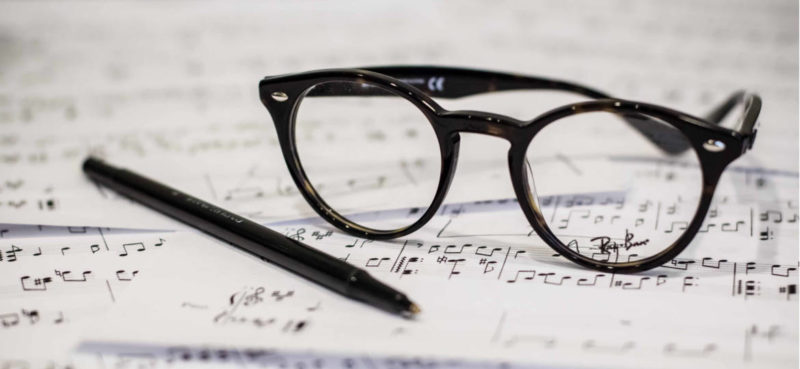

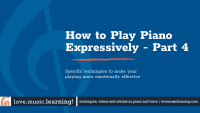
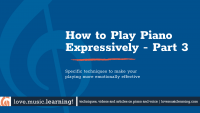
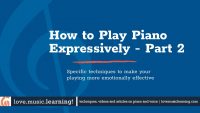
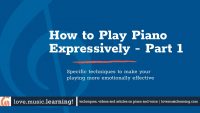
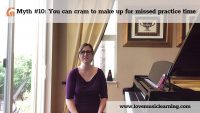
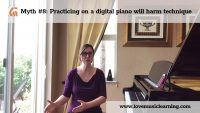
Leave A Comment
You must be logged in to post a comment.